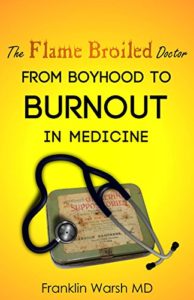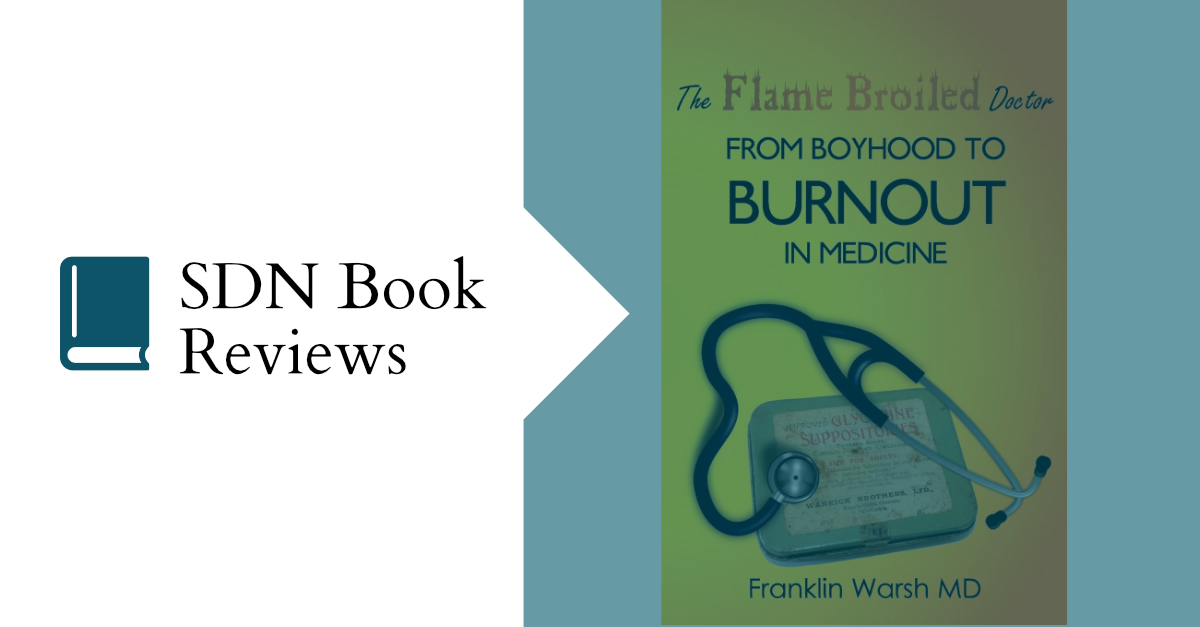Last Updated on February 18, 2019 by
Physician burnout is something of a hot topic nowadays. I say that not to belittle it—it is a major problem that needs to be discussed—but rather to make the point that it sometimes seems that the conversation is so broad and spans so much that there is nothing new to add to it. It can be difficult, among all of the thinkpieces, podcasts, and blog posts, to find anything about physician burnout that hasn’t already been said before. I am happy to report that Franklin Warsh’s The Flame-Broiled Doctor brings to the table a fresh perspective that adds nuance to this timely topic.
 The Flame-Broiled Doctor is the memoir of a burned-out family physician, from his unlikely admission into medical school to his final days as a doctor. To be frank, it isn’t an incredibly well-written book; if you are searching for Pulitzer-meriting material, you will have to look elsewhere. What this memoir lacks in literary merit, however, it makes up for in honesty. It strips away any of the glamor people may associate with medicine and presents a story that is incredibly candid and irreverently funny.
The Flame-Broiled Doctor is the memoir of a burned-out family physician, from his unlikely admission into medical school to his final days as a doctor. To be frank, it isn’t an incredibly well-written book; if you are searching for Pulitzer-meriting material, you will have to look elsewhere. What this memoir lacks in literary merit, however, it makes up for in honesty. It strips away any of the glamor people may associate with medicine and presents a story that is incredibly candid and irreverently funny.
At times, the tone of this book was frank to the point of arrogance; it teetered dangerously on the line between irreverent and offensive. Warsh knows this—he admits to these faults early on in the book, with such good-natured self-deprecation that it is impossible not to forgive him. However, the biggest problem this book has is organization; Warsh seems to have fallen into the common trap of describing events chronologically simply because that is the way things are done, not because it would make the most sense. Warsh’s use of vignettes, coupled with the insights he sprinkles without warning throughout the book, indicate to me that a better way of organizing this book would perhaps have been as short essays, connecting the insights to their corresponding vignettes instead of dealing with all of them chronologically and losing those connections.
Where The Flame-Broiled Doctor succeeds is in the moments when Warsh actively struggles with his decision to ultimately quit medicine. He has a short section at the very end where he attempts to outline exactly why he made that decision, but compared to the rest of the book, it sounds canned. The parts of the book that most resonate are when he grapples with his unhappiness.
All too often, the resources I have encountered on physician burnout portray it as very black and white. You read the anecdotes and you think, “Well, of course that sounds terrible. I would quit, too.” Warsh’s story is different; when you read it, you might think that Warsh had it pretty good. Throughout the book, I found myself asking, “Why did he quit?” The thing is, despite the irreverence and arrogance Warsh admits to, and despite the evident impatience the reader sometimes sees in his patient encounters, Warsh was a better doctor than many. His patients liked him, he was good at what he did, and he definitely enjoyed certain aspects of his job.
When you’re working insanely long shifts and not getting enough sleep or time to devote to your family or your hobbies, the reason for burnout is very evident. But as Warsh shows in his own case, it isn’t always so cut and dry; burnout can be insidious. It can make no sense. It can happen to anyone. That is why it so important to have these conversations and to tell stories like Frank Warsh’s.
Based on Warsh’s introduction (“this is the book I wish someone had placed in my hand before even applying to medical school”), it seems like this book is aimed more toward uninformed pre-meds, but there is also value in it for current medical students, doctors, other health professionals, and, honestly, anyone who is in the least interested in healthcare. While the discussion on burnout is central to the book, it also contains many patient stories and insights into healthcare. It’s also interesting to read a little bit about the Canadian system of healthcare to compare it to the healthcare found in the United States.
Overall, I’d give the book 4/5 stars. It isn’t the best book I’ve ever read by a long shot, but it is an open, insightful look into medicine that I, as a first-year medical student, am very happy to have read.
Book Review Rating Scale
* Would not, under any circumstances, recommend.
** OK, but ultimately a waste of time (that could have been better spent by reading a better book)
*** Good: enjoyable and worthwhile, but not worth a revisit
**** Very Good: highly recommended
***** Phenomenal: a must-read and a book I’d likely reread in the future

